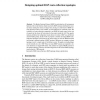Free Online Productivity Tools
i2Speak
i2Symbol
i2OCR
iTex2Img
iWeb2Print
iWeb2Shot
i2Type
iPdf2Split
iPdf2Merge
i2Bopomofo
i2Arabic
i2Style
i2Image
i2PDF
iLatex2Rtf
Sci2ools
NETWORKING
2008
2008
Designing Optimal iBGP Route-Reflection Topologies
The Border Gateway Protocol (BGP) is used today by all Autonomous Systems (AS) in the Internet. Inside each AS, iBGP sessions distribute the external routes among the routers. In large ASs, relying on a full-mesh of iBGP sessions between routers is not scalable, so route-reflection is commonly used. The scalability of route-reflection compared to an iBGP full-mesh comes at the cost of opacity in the choice of best routes by the routers inside the AS. This opacity induces problems like suboptimal route choices in terms of IGP cost, deflection and forwarding loops. In this work we propose a solution to design iBGP routereflection topologies which lead to the same routing as with an iBGP full-mesh and having a minimal number of iBGP sessions. Moreover we compute a robust topology even if a single node or link failure occurs. We apply our methodology on the network of a tier-1 ISP. Twice as many iBGP sessions are required to ensure robustness to single IGP failure. The number of required i...
| Added | 29 Oct 2010 |
| Updated | 29 Oct 2010 |
| Type | Conference |
| Year | 2008 |
| Where | NETWORKING |
| Authors | Marc-Olivier Buob, Steve Uhlig, Mickael Meulle |
Comments (0)

